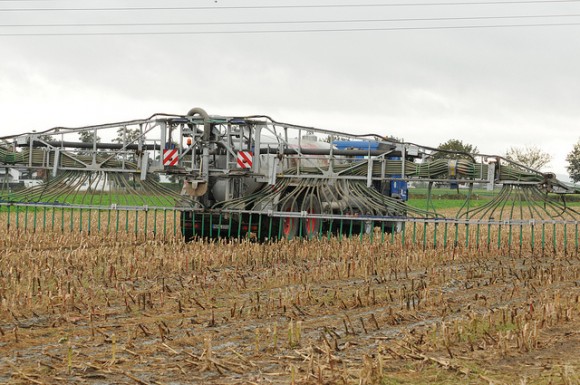
Sludge, Whose Jurisdiction? (Part 2)
by: Simon Davis-Cohen Posted on: August 10, 2012
Photo: Sustainable Sanitation, Flickr
Editor’s Note: Last year Wahkiakum County passed an ordinance to regulate the spreading of sludge/biosolids on agricultural land. Stating health concerns, the County holds that it has the right to enforce regulations on sludge/biosolids that are more stringent than those of Washington State. The ordinance bans the use of “Class B” sludge/biosolids—which are legal in Washington State—but still allows the use of “Class A”. “Class A” undergoes more stringent treatment than “Class B”. The Washington Department of Ecology thinks the ordinance violates the Washington State constitution.
We thought we’d ask Blair Brady, a Wahkiakum County Commissioner and Dan Bigelow, the Wahkiakum County Prosecuting Attorney, what they think.
See below to read Part 2, our discussion with Brady Blair, Wahkiakum County Commissioner:
What is sludge/biosolids?
A pretty name for human industrial waste.
What sparked the passage of the ordinance and what powers does the ordinance give Wahkiakum County to regulate sludge/biosolids?
We became aware of a proposed land application in our county that caused us to do research into the topic. With the immense amount of conflicting information about biosolids from reputable sources, we decided it would be prudent for us to protect our county by requiring a safer product than was proposed (at least to have no live organisms in it) by the parties involved.
Why does Wahkiakum County feel it necessary to more highly regulate the use of sludge/biosolids as fertilizer on agricultural land in Wahkiakum?
Public and environmental safety! A number of our county’s farmers are going organic. Protecting the land, fish and animals in our pristine county are of the utmost importance for our future.
What would be the effect if Washington Department of Ecology took over as the regulatory authority on sludge/biosolids in Wahkiakum County?
The obvious contamination of lands and risk of public and environmental health; we have many Endangered Species Act listed animals in our county.
Does Wahkiakum County possess positive rights, such as the right to ensure public health and safety?
It is my belief that is one of our prime duties to the public. I can not fathom why a Jurisdictional issue (possible a constitutional one) could be allowed to preempt public safety.
If the county views sludge/biosolìds (any classification) as a harmful to public health and safety why don’t they just ban it outright?
We all produce waste and must find ways to dispose of it. An outright ban is not feasible at this time. I personally see incineration as the most promising process currently being developed. It is also my desire to see any lands that have had application of these types of products to have this information permanently attached to the titles of the afore mentioned
One Response to “Sludge, Whose Jurisdiction? (Part 2)”
Articles On Dirt
Dirt: Dirt
- Mar 6 Re-Imagining Local Public Space, From Parks to Post Offices
- Nov 7 Google Cache Snapshot-Oregonlandco.com, 9/15/13
- Nov 7 Testimony
- Nov 7 Sustainable Forestry Initiative Confirms
- Sep 8 Why Label Genetically Modified Food?
- Sep 8 Why Not Label Genetically Modified Food?
- Sep 8 When Industrial Slaughterhouses Are Proposed
- Aug 8 ¡HUELGA! Mixteco and Triqui Farmworkers commence second Work Stoppage at Sakuma Brothers Farms, Inc.
- Aug 8 Bolivia: Building Resilience To Climate Change Through Indigenous Knowledge – The Case Of Bolivia
- Jun 8 A Conversation about School Lunches, a Student and a Farmer
- Oct 21 On Kids and Food
- Sep 30 Empowered Latino Farmers (Spanish & English Translations Included)
- Sep 16 Whatcom Farm-to-School: Tackling Food System Challenges One Lunch at a Time
- Aug 10 Sludge, Whose Jurisdiction? (Part 2)
- Jul 30 Sludge, Whose Jurisdiction? (Part 1)
- Jul 9 Rethinking the Peasant
- Jun 25 The Beginning of Regional Food Governance?
- May 29 Urban and Suburban Agriculture Empowers Environmental Stewards
- May 13 Northwest Soil Science: Nitrogen Mineralization
- Feb 3 WA Conservation Districts: An Introduction
- Jan 20 Planning For A Future: Protecting The Ground
- Jan 12 Recirculating Farms
- Dec 30 Columbia Basin Water Development
- Jan 25 No Fisherman Deserves a Toxic River
- Dec 15 Conserving Working Lands, Native Species, and Fertile Soil
- Nov 1 Protecting Dirt, Among Other Things
- Oct 25 Coming Soon


by: Paton: Saturday 17th of November 2012